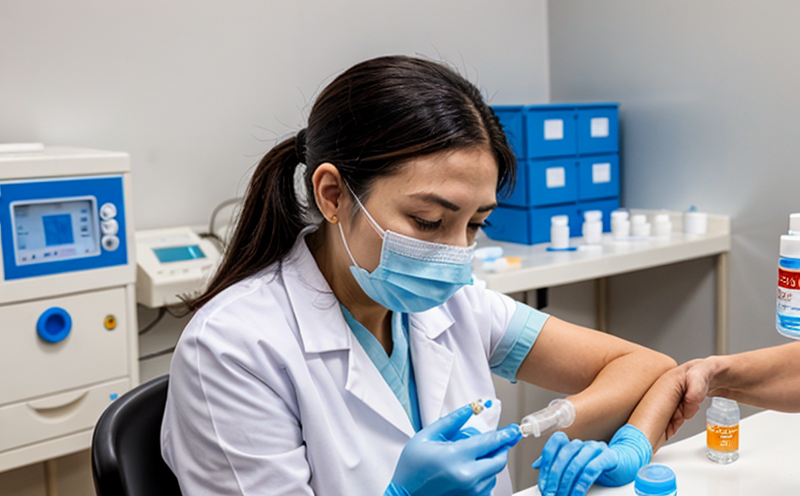USP Container Closure Integrity Testing of Vaccine Vials
The United States Pharmacopeia (USP) is a compendium of standards that are used to ensure the quality, safety, and efficacy of pharmaceutical products. USP Container Closure Integrity (CCI) testing plays a crucial role in ensuring that vaccine vials meet these stringent requirements for protecting the integrity of the product during storage and distribution.
CCI tests are designed to identify any defects or leaks within the container closure system, which could potentially lead to contamination or loss of the active pharmaceutical ingredient. This is especially critical for vaccines, as even a minor breach can compromise the vaccine’s potency and effectiveness. The CCI test ensures that the vial remains sealed properly until it is opened by the healthcare provider.
The testing process involves subjecting the vials to various pressure or vacuum tests to detect any flaws in the closure system. These tests are typically conducted using specialized equipment such as helium mass spectrometry, which can detect leaks down to 10-9 mbar·L/s.
The importance of CCI testing cannot be overstated, especially given the global demand for vaccines and the ongoing efforts to combat diseases like COVID-19. Ensuring that vaccine vials are free from defects is not only a regulatory requirement but also a matter of public health. A breach in container integrity can lead to wasted resources and potentially endanger patients by exposing them to ineffective or contaminated products.
Compliance with USP Chapter 1207, which deals with CCI testing, is essential for pharmaceutical manufacturers looking to meet regulatory standards and gain market acceptance. The test method ensures that the vaccine vials are safe and effective from the moment they leave the manufacturing facility until they reach the patient.
The USP CCI test involves several key steps:
- Visual inspection of the vial closure for any visible defects or imperfections.
- Pressure testing, where the vial is subjected to a controlled pressure to check for leaks.
- Vacuum testing, which simulates real-world storage conditions and checks for any changes in the vacuum level over time.
The results of these tests are meticulously recorded and reviewed by quality assurance teams. Any vials that fail the CCI test must be discarded or reprocessed according to established protocols.
By adhering to USP standards, pharmaceutical companies can ensure that their vaccines meet the highest safety and efficacy standards. This not only protects public health but also enhances consumer confidence in the product.
Scope and Methodology
The scope of USP CCI testing for vaccine vials is comprehensive and involves multiple steps to ensure that the container closure system meets strict quality and safety standards. The methodology typically includes:
- Visual Inspection: This initial step involves a thorough examination of each vial closure under magnification to detect any visible defects or imperfections.
- Pressure Testing: The vials are subjected to increasing pressure to check for any leaks. This test simulates the pressure that the vials may experience during transportation and storage.
- Vacuum Testing: In this step, the vials are placed in a vacuum chamber and monitored over time to ensure that no loss of vacuum occurs, indicating a potential leak or defect in the closure system.
The testing process is carried out using state-of-the-art equipment such as helium mass spectrometers, which can detect leaks down to 10-9 mbar·L/s. This level of sensitivity ensures that even minor defects are identified and addressed before the vials are released for distribution.
The results of each test are carefully documented and reviewed by a team of quality assurance professionals. Any vial that fails to meet the specified standards is immediately discarded or reprocessed, ensuring that only high-quality products reach the market.
Compliance with USP Chapter 1207 ensures that pharmaceutical manufacturers adhere to international standards and maintain a high level of quality control. This not only protects public health but also enhances consumer confidence in the product.
International Acceptance and Recognition
The USP CCI testing method is widely recognized and accepted by regulatory bodies around the world. Countries such as the European Union, Canada, Japan, and others have adopted these standards to ensure that pharmaceutical products meet the highest safety and efficacy standards.
In Europe, the Pharmacopoeia of the People's Republic of China (European Pharmacopoeia) also includes similar CCI testing requirements. In Japan, the Ministry of Health, Labour and Welfare mandates compliance with USP standards for vaccine vials. The Canadian regulatory body, the CANMEDS, also recognizes the importance of CCI testing in ensuring the integrity of pharmaceutical containers.
The global acceptance of these standards underscores their significance in maintaining public health and ensuring that vaccines are safe and effective. Compliance with USP Chapter 1207 is not only a regulatory requirement but also an essential step in protecting patients from potentially harmful products.
By adhering to these international standards, pharmaceutical manufacturers can ensure that their products meet the highest quality and safety standards. This not only enhances consumer confidence but also protects public health on a global scale.
Competitive Advantage and Market Impact
- Regulatory Compliance: Adhering to USP CCI standards ensures that pharmaceutical manufacturers meet regulatory requirements, giving them a competitive edge in the market.
- Patient Safety: By ensuring that vaccine vials are free from defects, companies can enhance patient safety and build trust with healthcare providers and consumers.
- Market Acceptance: Compliance with international standards increases market acceptance, as regulatory bodies around the world recognize USP CCI testing as a benchmark for quality.
- Quality Reputation: A strong reputation for adhering to high-quality standards can attract more customers and partnerships, enhancing brand value.
The global demand for vaccines continues to grow, driven by ongoing efforts to combat diseases like the flu, polio, and now the COVID-19 pandemic. Ensuring that vaccine vials meet stringent USP CCI testing requirements is not only a regulatory necessity but also a critical component of maintaining public health.
By prioritizing USP CCI testing, pharmaceutical manufacturers can differentiate themselves in a competitive market, ensuring that their products are safe and effective while gaining the trust of consumers and healthcare providers.





